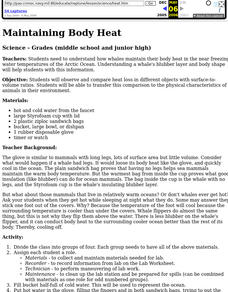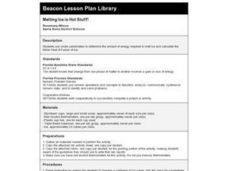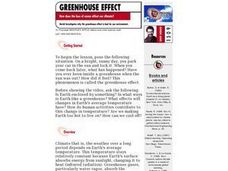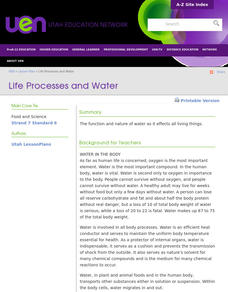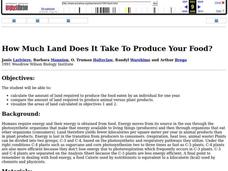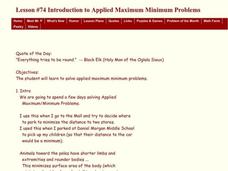Curated OER
Maintaining Body Heat
Students observe and compare heat loss in different objects with surface-to-volume ratios. They transfer this comparison to the physical characteristics of animals in their environment. They focus on how whales maintain their body heat.
Curated OER
Polystyrene Containers
Students conduct experiments to determine the effectiveness of polystyrene containers at preventing heat loss. For this polymers lesson, students design an experiment to determine how effective Styrofoam burger containers are at...
Curated OER
Melting Ice is Hot Stuff!
Fourth graders determine the amount of energy required to melt ice using a calorimeter. They calculate the Molar Heat of Fusion of Ice.
Curated OER
Inquiry into Heat Loss and Insulation
Students design an experiment to test the problem of the porridge in Baby Bear's bowl as being just right while the other porridge was either too hot or too cold. They explain the steps of their experiment and record their observations...
Curated OER
(S-1) Sunlight and the Earth
Students discuss the solar heating of the Earth and atmosphere, its heat loss proceses, and the way these relate to weather and climate.
Curated OER
Go With the Flow!
Students experiment with heat transfer in a countercurrent system and describe the importance of conduction in heat-energy transfer.
Teach Engineering
Exploring Energy: Energy Conversion
The energy is not really lost, it is just converted to a different form. Pupils learn about the conversion of energy in the fifth segment of an energy unit with six parts. Learners develop an understanding of the conservation of energy...
Curated OER
Scale Factors for Areas and Volumes
Students examine mathematical questions. They examine how to tackle mathematical questions and discover the effect of a change in length on area and volume. They examine the consequences of the physical properties sea animals on heat...
Curated OER
How Does the Loss of Ozone Affect Our Climate
Students explore the greenhouse effect and what it does to the environment. They discuss if and how human behavior contributes to global warming and test natural materials for carbon content.
University of Minnesota
Homeostasis of Thermoregulation
Whether you're battling the flu or trying to warm up on a chilly day, your body's ability to react to temperature change is fascinating! Anatomy scholars discover the fantastic feedback loops that control body temperature in a rigorous...
Curated OER
Why Don't Whales Have Legs?
Students are given a variety of materials and are asked to design a heat loss experiment that results in a reasonable explanation of "Why don't whales have legs?" students work with the theory of natural selection.
Curated OER
Life Processes and Water
Explain the properties of water. Identify the properties of water that make it a polar molecule Describe hydrogen bonds and how they differ from covalent bonds Discuss the differences between hard water and soft water Compare the heat of...
Curated OER
Hypothesize This!
Students role play scientists to prove a hypotheses. They determine whether or not walruses stay warmer in water or in air. Students also determine in which environment they lose more body heat.
Curated OER
Landscaping and Urban Forestry - Lesson 4 (Grades 5-6)
Students discuss reasons to plant trees and the best locations for cooling. They analyze two homes identifying types and locations of trees, and location of the central air conditioners. The benefits of shade, the process of...
National Renewable Energy Laboratory
Biomass: Biogas Generator
It's a gas. Middle schoolers build a biogas generator following the directions in this resource. After a few days of observation, they demonstrate that the gas given off by the decomposing manure is flammable. The activity concludes as...
Curated OER
Keeping Warm
Fifth graders measure the temperature of water using a thermometer. They record the temperatures of water on a chart. Students use the temperature data to determine which materials are the best conductors of heat. They discuss their...
Curated OER
Coal Moisture Analysis
Students investigate coal samples and analyze its drying loss under controlled conditions. They establish the loss in mass of a sample when heated under controlled conditions of temperature.
Curated OER
Colored H2 Balloon Explosions
Students perform an experiment in which they put different types of salts in a balloon, fill it with hydrogen gas, and ignite it. The electrons in the salt molecules are excited by the heat and release energy in the form of light. ...
Curated OER
Up, Up, and Away
Second graders observe the changes that water has when there is a change in a state of matter. In this lesson plan they observe the results of applying heat to water with the end result of conversion to a gas.
Curated OER
Go With the Energy Flow
Students explore energy and nutrient flow. In this science activity, students diagram the flow of energy through food chains and food webs. Students discuss the importance of energy flow in Earth's ecosystems.
Curated OER
Wasting Energy at Home
Students act as energy conservation engineers and identify the ways energy is conserved or wasted. They also discover many ways to personally conserve energy everyday. Students discover how engineers perform home energy audits to...
Curated OER
Peter Rabbit Meets Charles Darwin
Students start to think of evolution in terms of populations. The class follows a cartoon scenario of a rabbit population in which there is selection and change of gene frequency. They receive copies of the scenario or the whole thing...
Curated OER
How Much Land Does It Take To Produce Your Food?
Students calculate the amount of land required to produce the food eaten by an individual for one year. They compare the amount of land required to produce animal versus plant products. Students visualize the areas of land calculated.
Curated OER
Introduction to Applied Maximum Minimum Problems
Twelfth graders solve problems by finding the maximum and minimum. In this calculus lesson, 12th graders analyze certain animals identifying their maximum and minimum points. They also use bubble as part of their real world application...


